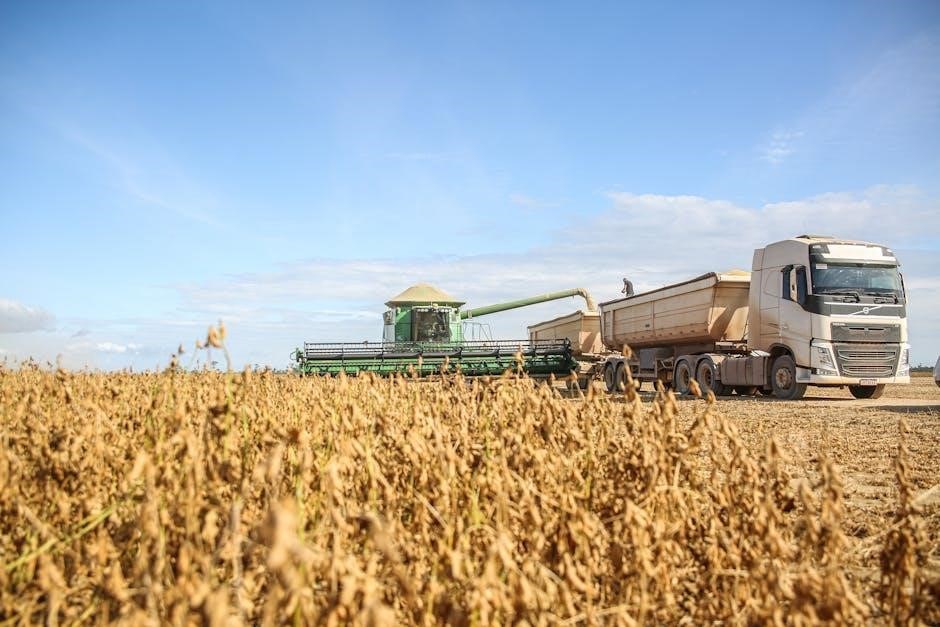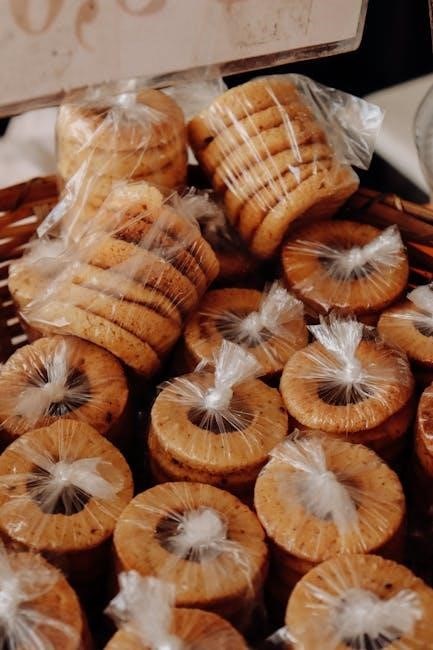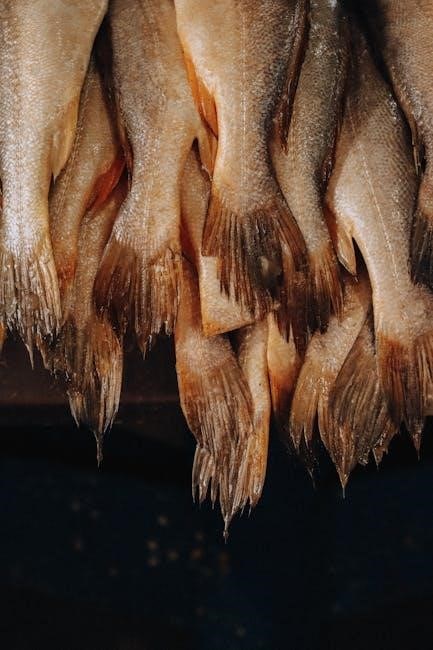
Dietary changes play a crucial role in managing diverticulitis, focusing on symptom relief and long-term prevention․ A high-fiber diet helps regulate bowel movements, reducing inflammation and complications․ Incorporating lean proteins, low-fiber fruits, and whole grains supports digestive health, while avoiding processed foods and extreme temperatures aids recovery and prevents flare-ups․ Proper hydration and mindful eating habits are essential for overall well-being․
1․1 What is Diverticulitis?
Diverticulitis is the inflammation or infection of small pouches (diverticula) that form in the walls of the digestive tract, often in the lower part of the colon․ Symptoms include abdominal pain, bloating, and changes in bowel habits․ It occurs when a low-fiber diet causes increased pressure during bowel movements, leading to complications․
1․2 The Role of Diet in Managing Diverticulitis
Diet plays a vital role in managing diverticulitis by reducing symptoms and preventing flare-ups․ A high-fiber diet helps soften stools, easing bowel movements and lowering pressure on the digestive tract․ Avoiding irritants like spicy or high-fat foods and staying hydrated can further alleviate discomfort and support healing during acute and recovery phases․
Understanding the Phases of a Diverticulitis Diet
A diverticulitis diet progresses through phases: acute (liquid-only), transition (low-fiber), and maintenance (high-fiber)․ Each phase aims to reduce symptoms, promote healing, and prevent future flare-ups effectively․
2․1 Acute Phase: Liquid Diet
The acute phase focuses on a liquid diet to manage symptoms like pain and inflammation․ Clear broths, fruit juices without pulp, and water are recommended․ This phase lasts a few days, allowing the bowel to heal․ It helps reduce irritation and supports recovery during the initial stages of diverticulitis․
2․2 Transition Phase: Low-Fiber Foods
During the transition phase, low-fiber foods are introduced to gradually reintroduce solids․ Options include bananas, applesauce, and white bread․ This phase avoids triggering symptoms by minimizing fiber intake, allowing the digestive system to adjust gently․ It follows the liquid diet and precedes the high-fiber maintenance phase․
2․3 Maintenance Phase: High-Fiber Diet
The maintenance phase emphasizes a high-fiber diet to support long-term digestive health․ Whole grains, fruits, vegetables, and legumes are encouraged to prevent complications․ Fiber helps regulate bowel movements and reduce inflammation․ This phase focuses on sustainable, balanced eating to promote overall well-being and prevent future episodes of diverticulitis effectively․
Foods to Avoid During Diverticulitis
Certain foods can worsen symptoms, such as high-fat, processed, and spicy items․ Avoiding caffeine, alcohol, and extreme food temperatures is also recommended to prevent discomfort and inflammation during flare-ups․
3․1 High-Fat and Processed Foods
High-fat and processed foods can slow digestion and worsen inflammation․ They are difficult to digest and may irritate the digestive tract, exacerbating diverticulitis symptoms․ Examples include fried foods, red meats, and processed snacks․ Avoiding these can help reduce discomfort and support recovery during acute phases and long-term management․
3․2 Spicy and High-Fiber Foods During Flares
Spicy and high-fiber foods can irritate the digestive system during diverticulitis flares, worsening inflammation and discomfort․ These foods may cause bloating, gas, and abdominal pain, potentially prolonging recovery․ It is advisable to avoid them temporarily until symptoms subside, then gradually reintroduce high-fiber foods as part of a long-term management plan․
3․4 Caffeine and Alcohol
Caffeine and alcohol can irritate the digestive system, worsening inflammation during diverticulitis flares․ Both should be avoided or consumed in moderation to prevent discomfort and promote healing․ Excessive intake may exacerbate symptoms like bloating, gas, and abdominal pain, hindering recovery and long-term management of the condition․

Recommended Foods for Diverticulitis Management
A balanced diet rich in lean proteins, low-fiber fruits, and whole grains supports digestion․ Foods like chicken, fish, bananas, and whole grain bread help manage symptoms and improve gut health․
4․1 Lean Proteins and Fish
Lean proteins like chicken, turkey, and fish are essential for managing diverticulitis․ Fish, such as cod and salmon, provide omega-3 fatty acids, reducing inflammation․ Opt for baked or grilled options without added fats or spices․ These proteins support digestive health and prevent complications, aiding in a balanced dietary approach for symptom relief and prevention․
4․2 Low-Fiber Fruits and Vegetables
Low-fiber options like bananas, applesauce, and soft-cooked vegetables (e․g․, carrots, green beans) are ideal during acute phases․ These foods are gentle on the digestive system, reducing irritation and inflammation․ Avoid high-fiber or raw alternatives to prevent discomfort and allow the digestive tract to heal effectively during flare-ups․
4․3 Whole Grains and Fiber-Rich Foods (Long-Term)
In the long term, incorporating whole grains like oats, quinoa, and whole-grain bread helps regulate bowel movements․ Fiber-rich foods, such as berries, broccoli, and legumes, strengthen digestive health and prevent complications․ A gradual increase in fiber intake supports the digestive system, promoting regularity and reducing the risk of future diverticulitis episodes effectively․
The Importance of Hydration
Staying hydrated aids digestion and prevents complications․ Aim for at least 8 cups of water daily․ Avoid caffeinated and carbonated drinks that can worsen symptoms and dehydration․
5․1 Daily Water Intake Recommendations
Aim for at least 2․5 liters of water daily, including fluids from herbal teas and clear broths․ Proper hydration supports digestion and prevents constipation, a common issue in diverticulitis․ Avoid caffeinated and carbonated drinks that can worsen dehydration and discomfort․ Consistent hydration helps manage symptoms and promotes overall gut health effectively․
5․2 Avoiding Caffeinated and Carbonated Drinks
Caffeinated and carbonated beverages can exacerbate digestive discomfort during diverticulitis․ They may cause bloating, gas, and irritation, worsening symptoms․ Opt for water, herbal teas, or clear broths instead to stay hydrated without triggering discomfort․ Limiting these drinks helps maintain a soothing diet and supports recovery during acute phases․
Physical Activity and Its Impact
Regular exercise reduces diverticulitis symptoms and improves digestion․ Activities like walking or yoga enhance bowel function, preventing complications․ Physical activity supports long-term management and overall health, aiding recovery and maintaining a healthy lifestyle․
6․1 Benefits of Regular Exercise
Regular exercise enhances digestion, reduces inflammation, and improves overall health․ It strengthens abdominal muscles, promoting bowel regularity and preventing complications․ Physical activity also aids in maintaining a healthy weight, which is crucial for managing diverticulitis and reducing symptom recurrence․
6․2 Recommended Types of Exercise
Low-impact exercises like brisk walking, swimming, and yoga are ideal for managing diverticulitis․ These activities improve digestion, strengthen abdominal muscles, and promote weight management without putting excessive strain on the digestive system․ Consistency is key to reducing symptoms and enhancing overall well-being․
Preventing Future Episodes
Preventing diverticulitis involves sustainable dietary changes, weight management, and avoiding smoking and alcohol․ A balanced diet rich in fiber and regular physical activity help maintain digestive health and reduce recurrence risk long-term․
7․1 Long-Term Dietary Changes
Adopting a high-fiber diet helps prevent diverticulitis recurrence by promoting regular bowel movements and reducing pressure on the digestive system․ Incorporate whole grains, fruits, and vegetables gradually, while avoiding processed and high-fat foods․ Staying hydrated and maintaining a balanced intake of lean proteins supports overall digestive health and long-term symptom management effectively always․
7․2 Weight Management
Maintaining a healthy weight reduces the risk of diverticulitis complications․ A balanced diet and regular exercise help avoid obesity, which increases pressure on the digestive system․ Excess weight can worsen symptoms, while a stable weight supports overall health and reduces inflammation, promoting long-term digestive well-being and preventing flare-ups effectively․
7․3 Avoiding Smoking and Alcohol
Smoking and alcohol can worsen diverticulitis symptoms by impairing blood flow and healing․ Smoking increases the risk of complications, while alcohol irritates the digestive system․ Both habits weaken the immune system, making recovery harder․ Avoiding them supports a high-fiber diet’s benefits, promoting better digestion and reducing inflammation for long-term health․
Mindful Eating Tips
Eat small, frequent meals to ease digestion, avoid extreme food temperatures, and stay hydrated․ Choose gentle, easily digestible foods, and monitor your body’s reactions to prevent discomfort and inflammation․
8․1 Eating Small, Frequent Meals
Eating small, frequent meals helps reduce digestive strain, preventing flare-ups․ Opt for 4-6 smaller portions daily, focusing on bland, low-fiber foods during acute phases․ This approach minimizes discomfort and supports healing․ Avoid heavy or spicy meals, and ensure meals are at room temperature to ease digestion and reduce irritation․
8․2 Avoiding Extreme Temperatures in Food
Avoiding extreme temperatures in food is crucial during a diverticulitis flare-up․ Extremely hot or cold foods and drinks can irritate the digestive system, worsening symptoms․ Opt for foods at room temperature to minimize discomfort and reduce the risk of further inflammation or irritation in the digestive tract․
8․3 Monitoring Food Tolerances
Monitoring food tolerances is essential to identify and avoid triggers that may worsen symptoms․ Track your diet to detect reactions to specific foods, such as spicy or high-fiber options․ Keeping a food diary can help pinpoint problematic foods, allowing for personalized adjustments to manage symptoms effectively and promote better digestion․

Common Mistakes to Avoid
Common mistakes include overconsumption of red meat, ignoring fiber recommendations, and rushing through diet phases․ These errors can worsen symptoms and hinder recovery․
9․1 Overconsumption of Red Meat
Overconsumption of red meat is a common mistake, as it increases the risk of diverticulitis symptoms․ Processed and high-fat meats can cause inflammation and worsen digestive issues․ A diet high in red meat is linked to a higher likelihood of diverticular disease․ It is recommended to limit red meat intake and opt for leaner protein sources like poultry or fish instead․
9․2 Ignoring Fiber Recommendations
Ignoring fiber recommendations can worsen diverticulitis symptoms and hinder recovery․ A diet lacking sufficient fiber leads to constipation, increasing pressure on the digestive system and potentially causing inflammation․ Adhering to fiber guidelines is essential for regulating bowel movements and reducing the risk of complications, promoting long-term digestive health and symptom management effectively․
9․3 Rushing the Transition Between Diet Phases
Rushing through the dietary phases can cause discomfort and slow recovery․ Transitioning too quickly may lead to inflammation or digestive issues․ It’s essential to follow each phase gradually, allowing the gut to heal properly․ Skipping steps can prolong symptoms and hinder the effectiveness of the dietary plan, delaying overall recovery and stability․

Supplements and Medications
Supplements like fiber and probiotics support gut health, while medications, including antibiotics, address inflammation and infections․ These aids help manage symptoms and prevent complications during recovery․
10․1 Fiber Supplements
Fiber supplements, such as psyllium or methylcellulose, are often recommended to soften stools and reduce irritation in the digestive tract․ They are particularly beneficial during the acute phase of diverticulitis to minimize discomfort and prevent further inflammation․ Always consult a healthcare provider before starting any supplementation to ensure proper dosage and suitability․
10․2 Probiotics and Their Role
Probiotics support digestive health by promoting beneficial gut bacteria․ They may reduce inflammation and improve symptoms in diverticulitis․ Probiotics can aid in regulating bowel movements and preventing complications․ It is essential to consult a healthcare provider before adding probiotics to your diet to ensure they are suitable for your condition․
10․3 Antibiotics in Acute Cases
Antibiotics are often prescribed to treat bacterial infections in acute diverticulitis․ They help reduce inflammation and prevent complications․ However, antibiotics should only be used under medical guidance, as not all cases require them․ Probiotics may be recommended to restore gut balance after antibiotic treatment․ Always consult a healthcare provider before starting any medication․

Long-Term Management Strategies
Long-term management involves maintaining a balanced diet, staying hydrated, and exercising regularly․ Regular check-ups and stress management techniques also support overall health and prevent future episodes effectively․
11․1 Sustaining a Balanced Diet
A high-fiber diet rich in whole grains, lean proteins, and low-fiber fruits and vegetables supports long-term management․ Avoiding processed foods, red meat, and extreme food temperatures helps maintain digestive health․ Incorporating probiotics and staying hydrated further promote a balanced diet, reducing the risk of future diverticulitis episodes and improving overall well-being effectively․
11․2 Regular Health Check-Ups
Regular health check-ups are essential for monitoring diverticulitis symptoms and adjusting treatment plans․ They help identify potential complications early and ensure dietary adjustments are effective․ Routine exams also assess risk factors like weight and fiber intake, promoting long-term health and preventing future episodes through proactive care and lifestyle modifications․
11․3 Stress Management Techniques
Stress management is vital for diverticulitis care, as stress can worsen symptoms․ Techniques like meditation, yoga, and deep breathing help reduce stress and improve digestion․ A calm mind-body connection supports healing and prevents flare-ups, promoting overall well-being and dietary adherence․ Regular relaxation practices enhance long-term management and quality of life for patients․
A well-balanced diet, hydration, and lifestyle changes are key to managing diverticulitis․ Adhering to dietary guidelines and maintaining regular health check-ups ensures long-term wellness and prevents future episodes effectively․
12․1 Summary of Key Dietary Practices
A high-fiber diet, adequate hydration, and avoidance of processed foods are essential․ Incorporate lean proteins, whole grains, and low-fiber fruits and vegetables during recovery․ Mindful eating, small meals, and avoiding extreme food temperatures support digestion․ Long-term adherence to these practices helps manage symptoms and prevent future episodes effectively․
12․2 Encouragement for Long-Term Adherence
Embracing a balanced diet and healthy lifestyle is key to managing diverticulitis long-term․ Consistent hydration, fiber intake, and avoiding triggers can significantly reduce symptoms and prevent future episodes․ Small, sustainable changes lead to lasting improvements, empowering individuals to maintain digestive health and overall well-being effectively․




